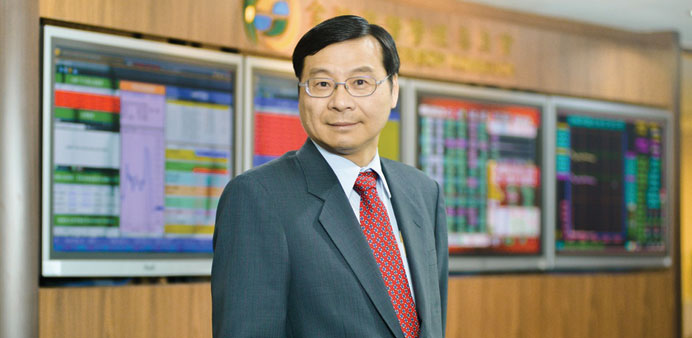Bloomberg
Bangkok
Taiwan needs to further liberalise its financial markets or risk falling behind its neighbours, the island’s top financial regulator said.
Since becoming Minister of the Financial Supervisory Commission in 2013, Tseng Ming-chung has widened the daily limit for how much stocks can rise or fall by, loosened restrictions on intraday trading and margin lending and allowed Taiwan’s life insurers to invest more assets overseas. More needs to be done, the 56-year-old said in an interview on Friday.
“Taiwan’s capital markets had a head start in the early 1990s,” Tseng said. “The volume was higher then and now it’s facing a bottleneck. I wanted to do a comprehensive review of the whole system and to have trading rules be fully in line with international norms.” Having executed on those measures, which have come to be known as the “first wave” of reforms, Taiwanese policymakers are now reviewing what steps to take next. Loosening restrictions on exchange-traded funds and introducing derivatives linked to gold are among moves being studied for that “second wave,” Tseng said in a separate statement.
Among those who have noted Tseng’s role in pushing forward reforms has been the US Treasury Department, which in an April report cited his leadership in giving Taiwan’s banks and insurers a greater ability to invest and make acquisitions overseas. The most recent reform – an adjustment of the daily stock trading limit to 10% from 7% – took effect on June 1.
“Based on Taiwan’s level of capital markets development, we shouldn’t have a 7% trading limit,” Tseng said, citing wider daily trading ranges in markets like South Korea, Thailand and Malaysia. “The best markets have no trading limits at all.” Last year, Tseng opened the spigot on about $600bn of life insurance assets for investment in foreign-currency bonds.
This year, one of his focuses is to induce more ethnic Chinese visiting Taiwan to put their money in the island’s insurance policies, mutual funds and bonds. Those visitors have increased as more travellers from China are allowed to come to Taiwan, with 4mn having done so last year.
“One of my goals is to ‘walk out,’ not just to China but to all of Asia,” Tseng said. “And the other is to bring people to Taiwan.” Taiwan’s banks also need to step up the pace of their overseas acquisitions, Tseng said, especially in places like Myanmar, the Philippines, Vietnam and Indonesia. If Taiwan’s banks do nothing, Tseng said, “Southeast Asia banks may come and buy our banks,” given the rate at which those economies are expanding.
Previously a deputy finance minister, Tseng said on Friday Taiwan continues to have too many banks, with its top three financial institutions holding only about 20% market share, compared to over 40% among the top three US banks, and more than 90% market share among Singapore’s largest three firms.

Tseng: Getting ready for ‘second wave’ of reforms.
